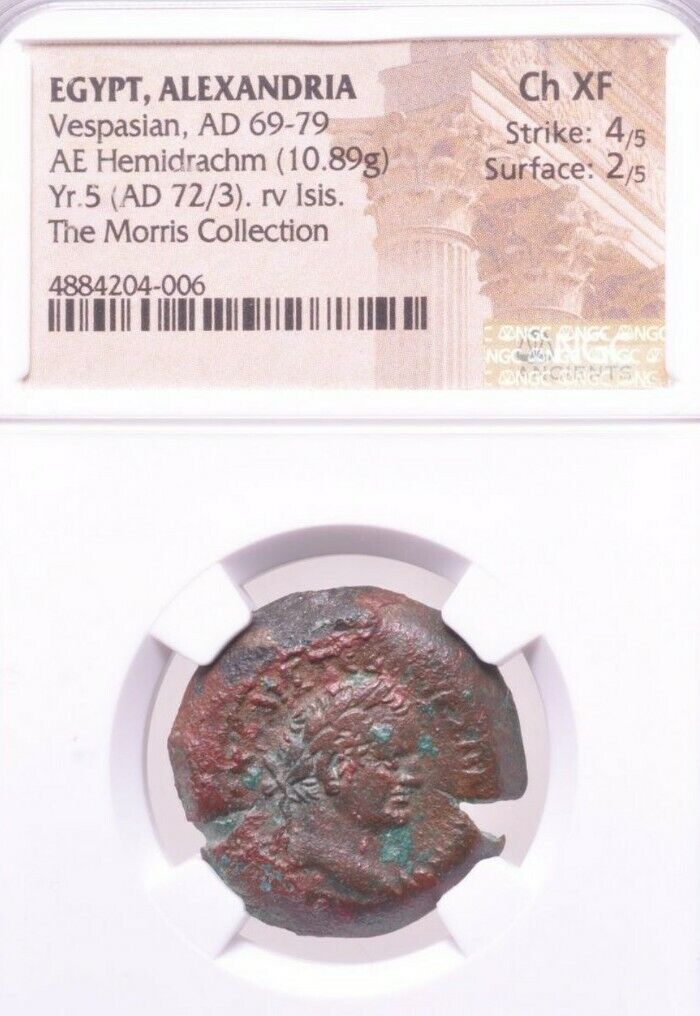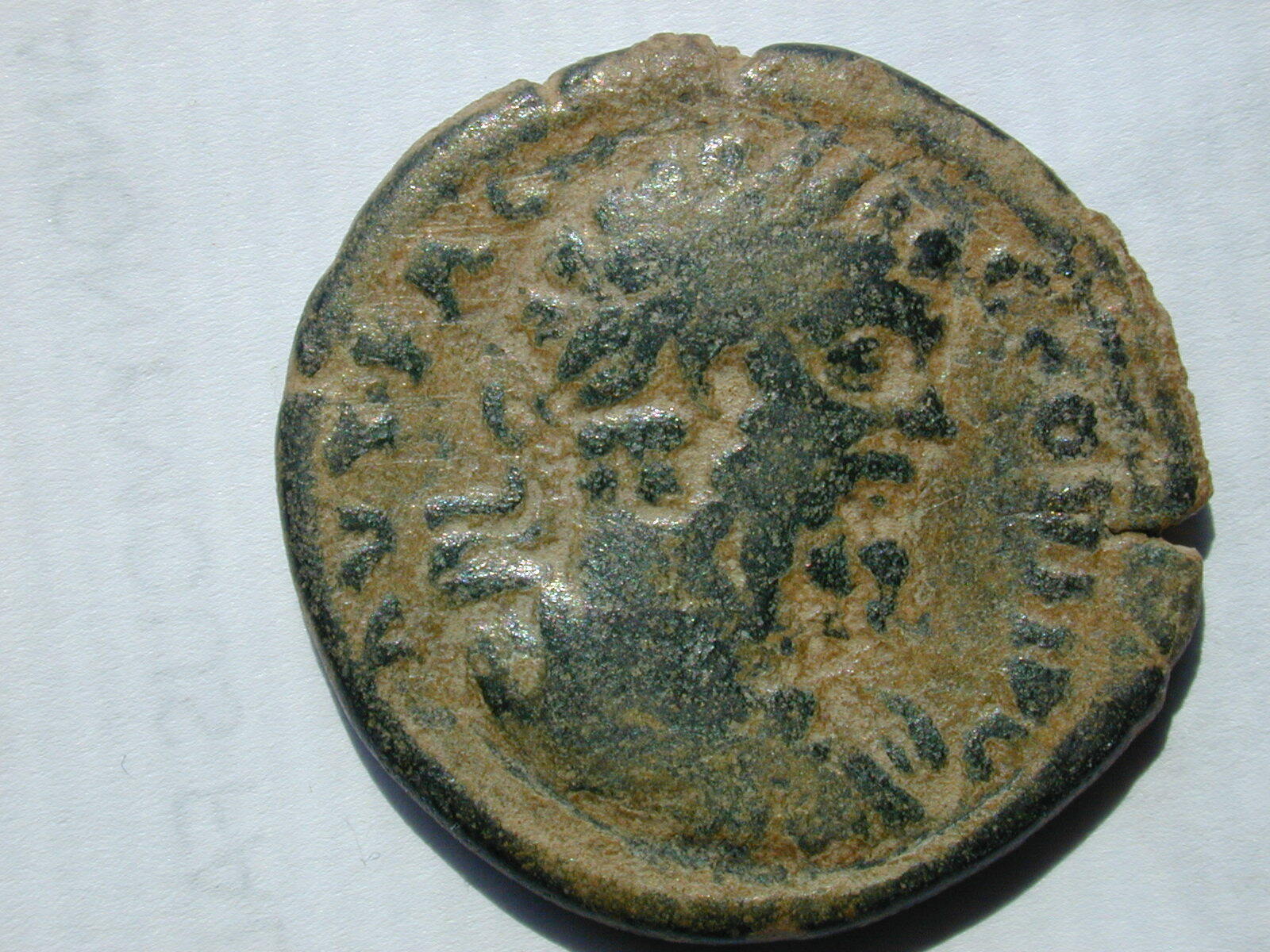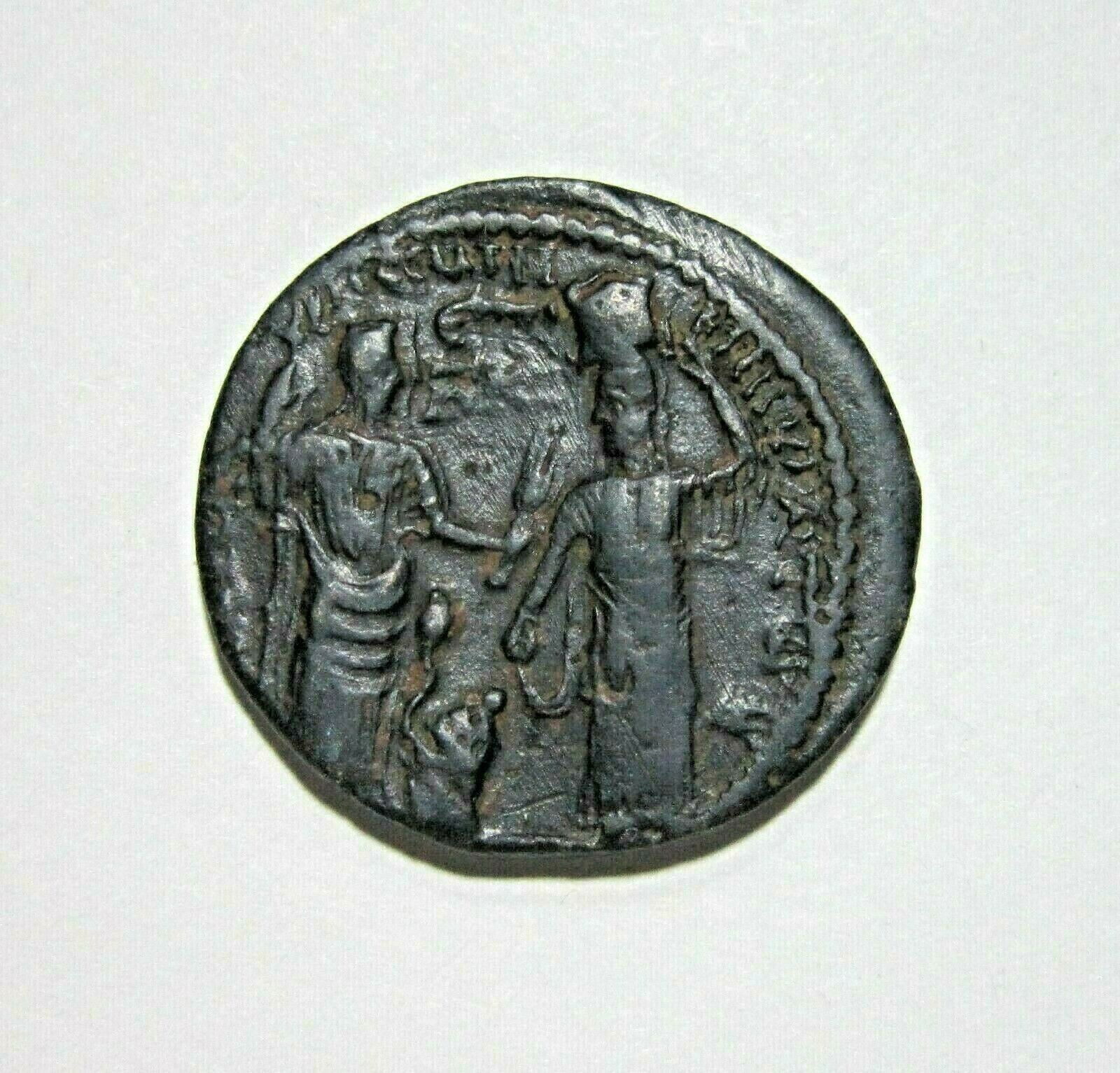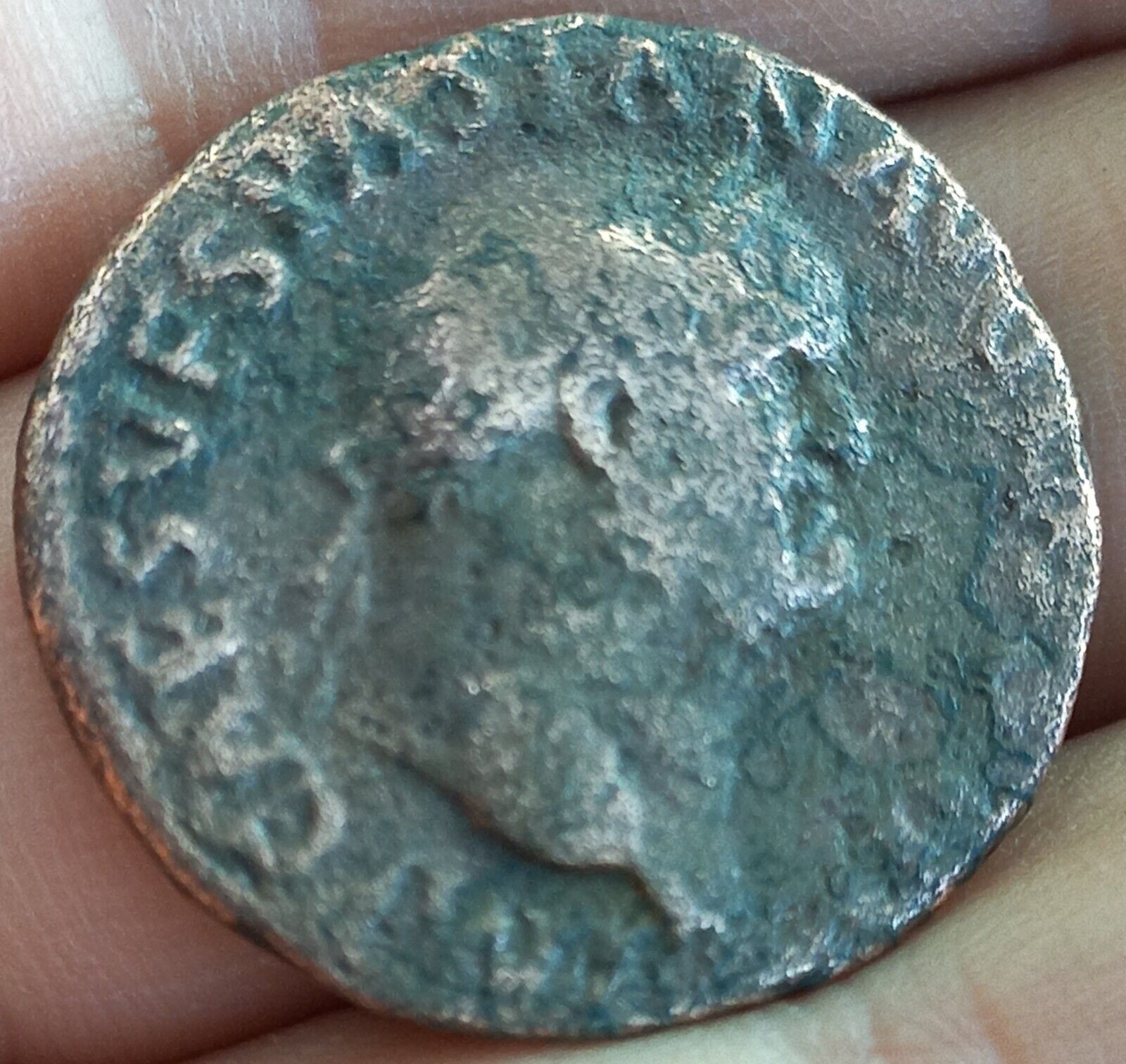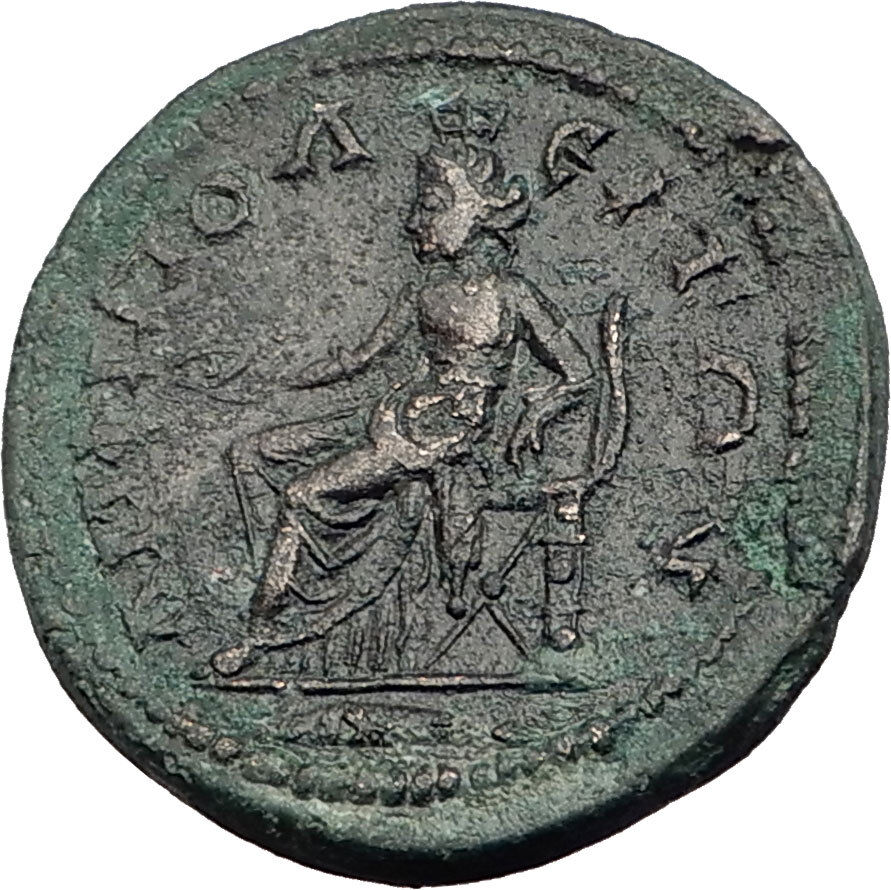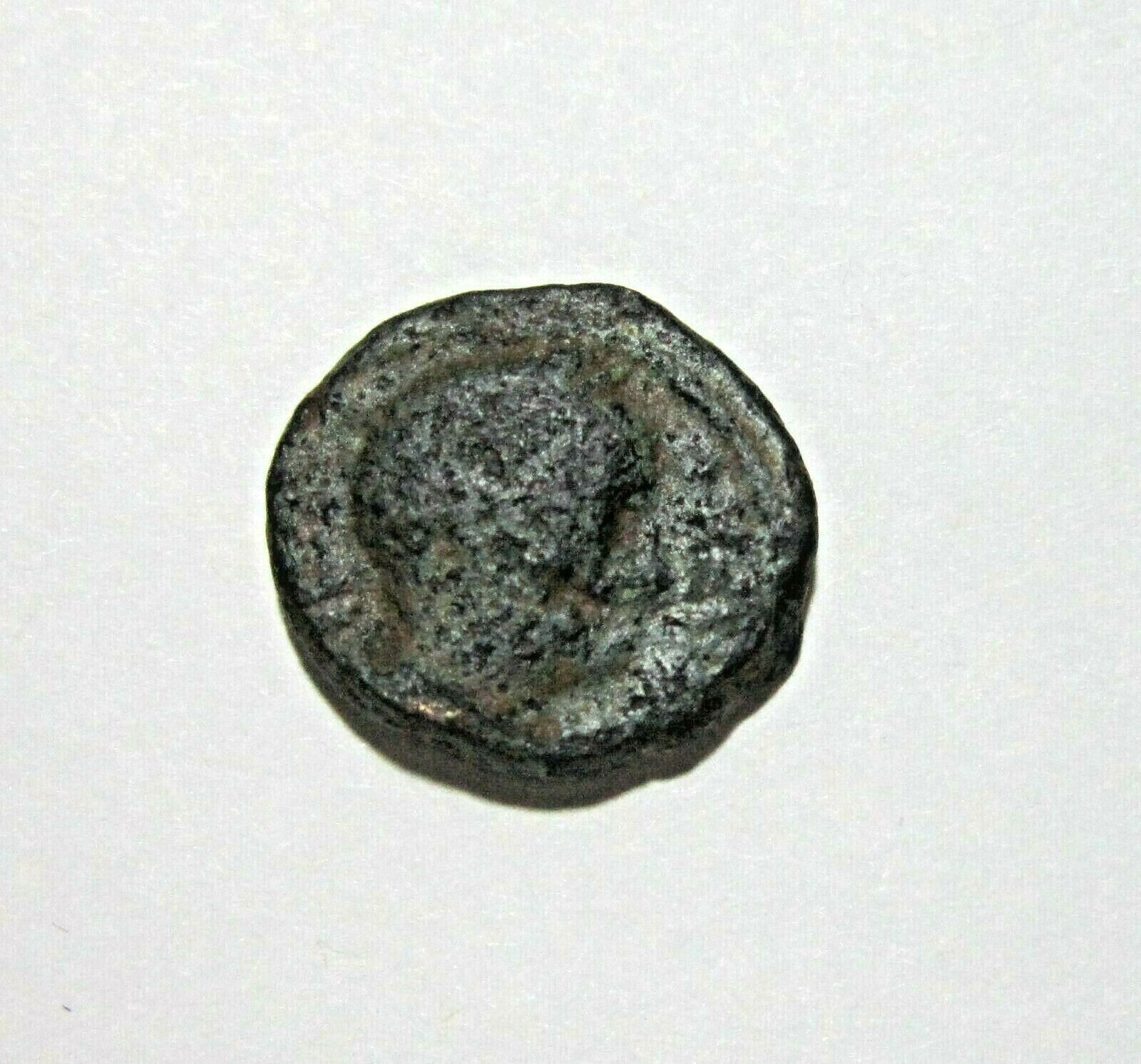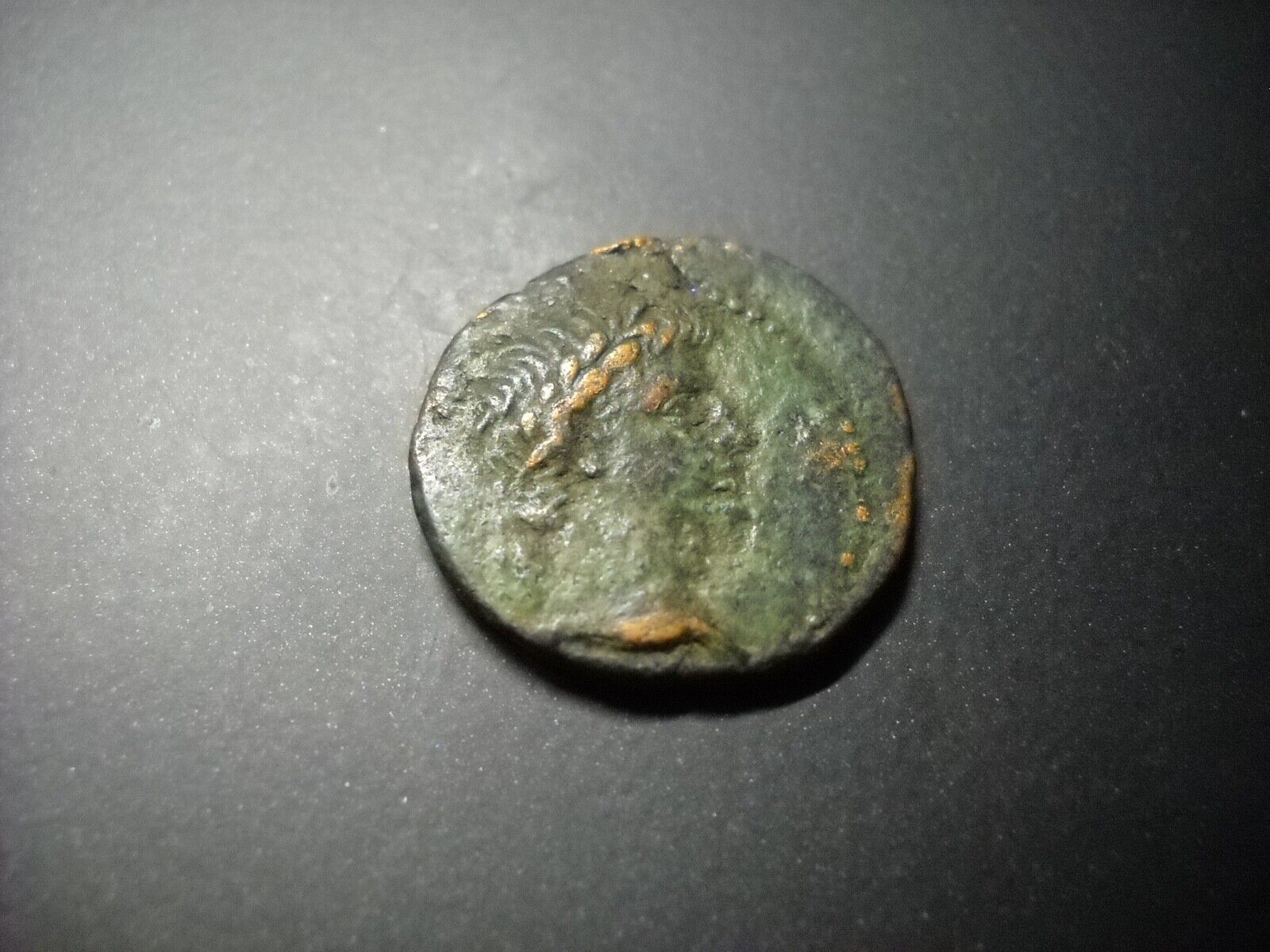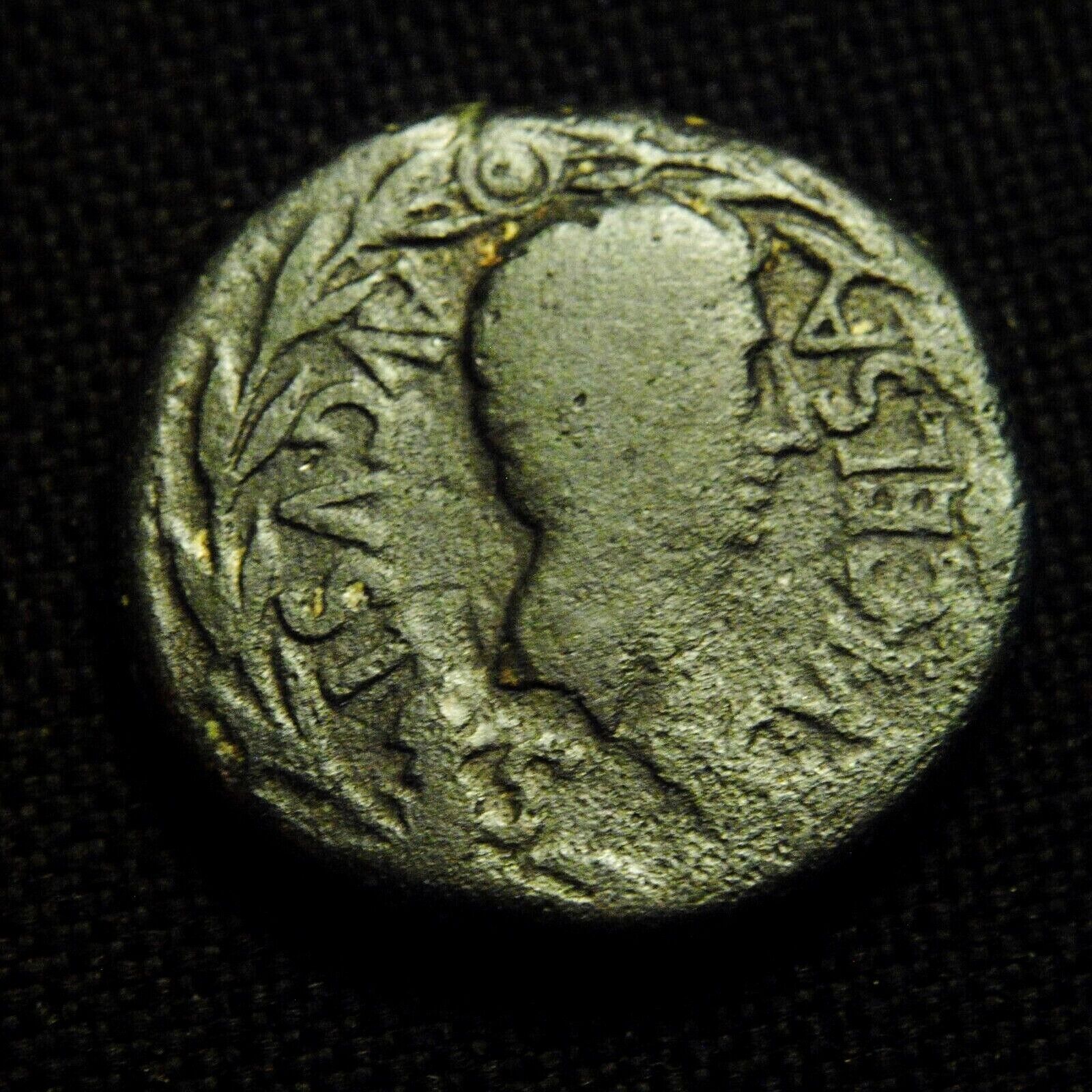-40%
SEVERUS ALEXANDER Marcianopolis Rare Ancient Roman Coin Nemesis Rhamnous i48223
$ 36.96
- Description
- Size Guide
Description
Item:i48223
Authentic Ancient Coin of:
<="" font="" color="#000000" face="Times New Roman">
Severus Alexander
-
Roman Emperor
: 222-235 A.D.
Severus Alexander
as Caesar
Bronze 25mm (7.05 grams) of Roman provincial mint
<="" font="" color="#000000" face="Times New Roman"> Marcianopolis in Moesia Inferior
Laureate, draped and cuirassed bust right.
V Π TIB IOVΛ ФHCTOV MAPKIANOΠOΛITΩN, [ under Legate Tiberius Julius Festus ] -
Nemesis
standing left holding scales and scepter, wheel at feet.
You are bidding on the exact item pictured, provided with a Certificate of Authenticity and Lifetime Guarantee of Authenticity.
In
Greek mythology
,
Nemesis
(
Greek
,
Νέμεσις
), also called
Rhamnousia/Rhamnusia
("the
goddess
of
Rhamnous
") at her sanctuary at
Rhamnous
, north of
Marathon
, was the spirit of divine
retribution
against those who succumb to
hubris
(arrogance before the gods). Another name was
Adrasteia
, meaning "the inescapable." The Greeks personified vengeful
fate
as a remorseless goddess: the goddess of revenge. The name
Nemesis
is related to the
Greek
word νέμειν [némein], meaning "to give what is due".
Background
Divine retribution is a major theme in the Hellenic world view, providing the unifying theme of the
tragedies
of
Sophocles
and many other literary works.
Hesiod
states: "Also deadly
Nyx
bore Nemesis an affliction to mortals subject to death." (
Theogony
, 223, though perhaps an interpolated line). Nemesis appears in a still more concrete form in a fragment of the epic
Cypria
.
She is implacable justice: that of
Zeus
in the
Olympian
scheme of things, although it is clear she existed prior to him, as her images look similar to several other goddesses, such as
Cybele
,
Rhea
,
Demeter
and
Artemis
.
As the "Goddess of Rhamnous", Nemesis was honored and placated in an archaic sanctuary in the isolated district of Rhamnous, in northeastern
Attica
. There she was a daughter of
Oceanus
, the primeval river-ocean that encircles the world.
Pausanias
noted her iconic statue there. It included a crown of stags and little
Nikes
and was made by
Pheidias
after the
Battle of Marathon
(490 BC), crafted from a block of
Parian
marble
brought by the overconfident Persians, who had intended to make a memorial
stele
after their expected victory.
Origins
Nemesis has been described as the daughter of
Oceanus
or
Zeus
, but according to
Hesiod
she was a child of
Erebus
and
Nyx
. She has also been described as the daughter of Nyx alone. Her cult may have originated at
Smyrna
.
In some metaphysical mythology, Nemesis produced the egg from which hatched two sets of twins:
Helen of Troy
and
Clytemnestra
, and the
Dioscuri
,
Castor and Pollux
. While many myths indicate
Zeus
and
Leda
to be the parents of
Helen of Troy
, the author of the compilation of myth called
Bibliotheke
notes the possibility of Nemesis being the mother of Helen; Nemesis, to avoid Zeus, turns into a goose, but he turns into a swan and mates with her. Nemesis in her bird form lays an egg that is discovered in the marshes by a shepherd, who passes the egg to
Leda
. It is in this way that
Leda
comes to be the mother of
Helen of Troy
, as she kept the egg in a chest until it hatched.
Ac
ts and Deeds
Although a respected goddess, Nemesis had brought much sorrow to mortals like
Echo
and
Narcissus
. Narcissus was a very beautiful and arrogant hunter from the territory of
Thespiae
and
Boeotia
who disdained the ones who loved him. Nemesis lured him to a pool where he saw his own reflection in the water and fell in love with it, not realizing it was only an image. He was unable to leave the beauty of his reflection and he eventually died. Nemesis believed that no one should ever have too much good, and she had always cursed those who were blessed with countless gifts.
Fortune and retribution
The word
Nemesis
originally meant the distributor of fortune, neither good nor bad, simply in due proportion to each according to what was deserved; then,
nemesis
came to suggest the resentment caused by any disturbance of this right proportion, the sense of justice which could not allow it to pass unpunished.
O. Gruppe
(1906) and others connect the name with "to feel just resentment". From the 4th century onwards, Nemesis, as the just balancer of
Fortune
's chance, could be associated with
Tyche
.
In the
Greek tragedies
Nemesis appears chiefly as the avenger of crime and the punisher of
hubris
, and as such is akin to
Atë
and the
Erinyes
. She was sometimes called "
Adrasteia
", probably meaning "one from whom there is no escape"; her epithet
Erinys
("implacable") is specially applied to Demeter and the
Phrygian
mother goddess,
Cybele
.
Local cult
A festival called
Nemeseia
(by some identified with the
Genesia
) was held at
Athens
. Its object was to avert the nemesis of the dead, who were supposed to have the power of punishing the living, if their cult had been in any way neglected (
Sophocles
,
Electra
,
792;
E. Rohde
,
Psyche,
1907, i. 236, note I).
At
Smyrna
there were two manifestations of Nemesis, more akin to
Aphrodite
than to Artemis. The reason for this duality is hard to explain; it is suggested that they represent two aspects of the goddess, the kindly and the implacable, or the goddesses of the old city and the new city refounded by Alexander. The martyrology
Acts of
Pionius
, set in the "
Decian persecution
" of AD 250–51, mentions a lapsed Smyrnan Christian who was attending to the sacrifices at the altar of the temple of these Nemeses.
Rome
Pax-Nemesis
was worshipped on occasion at
Rome
by victorious generals, and in imperial times was the patroness of
gladiators
and of the
venatores
, who fought in the arena with wild beasts, and was one of the
tutelary deities
of the drilling-ground (
Nemesis campestris
). Sometimes, but rarely, seen on imperial coinage, mainly under
Claudius
and
Hadrian
. In the 3rd century AD there is evidence of the belief in an all-powerful
Nemesis-Fortuna
. She was worshipped by a society called Hadrian's freedmen. The poet
Mesomedes
wrote a hymn to Nemesis in the early 2nd century CE, where he addressed her
Nemesis, winged balancer of life,
dark-faced goddess, daughter of Justice,
and mentioned her "adamantine bridles" that restrain "the frivolous insolences of mortals."
In early times the representations of Nemesis resembled Aphrodite, who herself sometimes bears the epithet Nemesis. Later, as the maiden goddess of proportion and the
avenger of crime
, she has as attributes a
measuring rod
(
tally stick
), a
bridle
,
scales
, a
sword
and a
scourge
, and rides in a
chariot
drawn by
griffins
.
Nemesis is also known to have been called "
Adrastia
". Ammianus Marcellinus includes her in a digression on Justice following his description of the death of Gallus Caesar.
In modern literature
Percy Jackson & the Olympians
- Nemesis is mentioned as the goddess of revenge, and the mother of a minor antagonist, Ethan Nakamura, who claims Nemesis traded his eye for power.
The Heroes of Olympus
- Nemesis appears in
The Mark of Athena
, and gives
Leo Valdez
a
fortune cookie
that can solve a problem he cannot solve on his own, for a price. She is mentioned to have a motorcycle with
Pac-Man
-like wheels.
Project: Nemesis
is about a
kaiju
who was the basis for the myth of Nemesis. In the novel the monster is resurrected using the DNA of a murdered girl and cuts a path of destruction to Boston so it can exact revenge on the murderer.
Nemesis by Agatha Christie. The main protagonist, Miss Jane Marple, an elderly woman who often finds herself solving murders, describes herself as 'Nemesis'.
Marcianopolis
, or
Marcianople
was an ancient Roman city in
Thracia
. It was located at the site of modern day
Devnya
,
Bulgaria
.
The city was so renamed by Emperor
Trajan
after his sister
Ulpia Marciana
, and was previously known as Parthenopolis. Romans repulsed a
Gothic
attack to this town in
267
(or
268
), during the reign of
Gallienus
.
Diocletian
made it the capital of the
Moesia Secunda
province.
Valens
made it his winter quarters in 368 and succeeding years, Emperor
Justinian I
restored and fortified it. In 587, it was sacked by the king of the
Avars
but at once retaken by the Romans. The Roman army quartered there in 596 before crossing the Danube to assault the Avars.
Between 893 and 972 it was one of the most important medieval cities in south-eastern Europe.
SEVERUS ALEXANDER
Augustus:
A.D. 222-235
Caesar:
A.D. 221-222 under Elagabalus
Son of Julia Mamaea
Husband of Orbiana
Grandson of Julia Maesa
Nephew of Julia Soaemias
Cousin of Elagabalus
Second-cousin of Caracalla and Geta
Great-newphew of Septimius Severus and Julia Domna
Marcus Aurelius Severus Alexander
(October 1, 208–March 18, 235 AD), commonly called
Alexander Severus
, was the last
Roman emperor
(11 March 222–235) of the
Severan dynasty
. Alexander Severus succeeded his cousin,
Elagabalus
upon the latter's assassination in 222 AD, and was ultimately assassinated himself, marking the
epoch event
for the
Crisis of the Third Century
—nearly fifty years of disorder, Roman civil wars, economic chaos, regional rebellions, and external threats that brought the Empire to near-collapse.
Alexander Severus was the
heir apparent
to his cousin, the eighteen-year-old Emperor who had been murdered along with his mother by his own guards—and as a mark of contempt, had their remains cast into the
Tiber river
. He and his cousin were both grandsons of the influential and powerful
Julia Maesa
, who had arranged for Elagabalus' acclamation as Emperor by the famed
Third Gallic Legion
.
A rumor of Alexander's death circulated, triggering the assassination of Elagabalus.
Alexander's reign was marked by troubles. In military conflict against the rising
Sassanid Empire
, there are mixed accounts, though the Sassanid threat was checked. However, when campaigning against
Germanic tribes
of
Germania
, Alexander Severus apparently alienated his legions by trying diplomacy and bribery, and they assassinated him.
Life
Alexander was born with the name
Marcus Julius Gessius Bassianus Alexianus
. Alexander's father,
Marcus Julius Gessius Marcianus
was a Syrian
Promagistrate
. His mother
Julia Avita Mamaea
was the second daughter of
Julia Maesa
and Syrian noble
Julius Avitus
and maternal aunt of Emperor
Elagabalus
. He had an elder sister called Theoclia and little is known about her. Alexander's maternal great-aunt was empress
Julia Domna
(also Maesa's younger sister) and his great-uncle in marriage was emperor Lucius
Septimius Severus
. Emperors
Caracalla
and
Publius Septimius Geta
, were his mother's maternal cousins. In 221, Alexander's grandmother, Maesa, persuaded the emperor to adopt his cousin as successor and make him
Caesar
and Bassianus changed his name to Alexander. In the following year, on March 11, Elagabalus was murdered, and Alexander was proclaimed emperor by the
Praetorians
and accepted by the Senate.
When Alexander became emperor, he was young, amiable, well-meaning, and entirely under the dominion of his mother. Julia Mamaea was a woman of many virtues, and she surrounded the young emperor with wise counsellors. She watched over the development of her son's character and improved the tone of the administration. On the other hand, she was inordinately jealous. She also alienated the army by extreme parsimony, and neither she nor her son were strong enough to impose military discipline. Mutinies became frequent in all parts of the empire; to one of them the life of the jurist and praetorian praefect
Ulpian
was sacrificed; another compelled the retirement of
Cassius Dio
from his command.
On the whole, however, the reign of Alexander was prosperous until the rise, in the east, of the
Sassanids
. Of the war that followed there are various accounts. (
Mommsen
leans to that which is least favourable to the Romans). According to Alexander's own dispatch to the senate, he gained great victories. At all events, though the Sassanids were checked for the time, the conduct of the Roman army showed an extraordinary lack of discipline. The emperor returned to
Rome
and celebrated a triumph in 233.
The following year he was called to face German invaders in
Gaul
, who had breached the Rhine frontier in several places, destroying forts and over-running the countryside. Alexander mustered his forces, bringing legions from the eastern provinces, and crossed the Rhine into Germany on a pontoon bridge. Initially he attempted to buy the German tribes off, so as to gain time. Whether this was a wise policy or not, it caused the Roman legionaries to look down on their emperor as one who was prepared to commit unsoldierly conduct.
Herodian
says "in their opinion Alexander showed no honourable intention to pursue the war and preferred a life of ease, when he should have marched out to punish the Germans for their previous insolence". These circumstances drove the army to look for a new leader. They chose
Gaius Iulius Verus Maximinus
, a Thracian soldier who had worked his way up through the ranks.
Following the nomination of Maximinus as emperor, Alexander was slain (on either March 18 or March 19, 235), together with his mother, in a mutiny of the
Primigenia
Legio XXII
. These assassinations secured the throne for Maximinus.
The death of Alexander is considered as the end of the
Principate
system established by
Augustus
. Although the
Principate
continued in theory until the reign of
Diocletian
, Alexander Severus' death signalled the beginning of the chaotic period known as the
Crisis of the Third Century
which weakened the empire considerably.
Legacy
Alexander was the last of the Syrian emperors. Under the influence of his mother, he did much to improve the morals and condition of the people. His advisers were men like the famous jurist Ulpian, the historian Cassius Dio and a select board of sixteen senators; a municipal council of fourteen assisted the urban praefect in administering the affairs of the fourteen districts of Rome. The luxury and extravagance that had formerly been so prevalent at the court were put down; the standard of the coinage was raised; taxes were lightened; literature, art and science were encouraged; the lot of the soldiers was improved; and, for the convenience of the people, loan offices were instituted for lending money at a moderate rate of interest.
In religious matters Alexander preserved an open mind. It is said that he was desirous of erecting a temple to the
founder of Christianity
, but was dissuaded by the pagan priests.
Marriage
Alexander was married three times. His most famous wife was
Sallustia Orbiana
,
Augusta
,
whom he married in 225. He divorced and exiled her in 227, after her father,
Seius Sallustius
, was executed for attempting to assassinate the emperor. Another wife was Sulpicia Memmia. Her father was a man of consular rank; her grandfather's name was
Catulus
.
="">="">
Frequently Asked Questions
How long until my order is shipped?
Depending on the volume of sales, it may take up to 5 business days for shipment of your order after the receipt of payment.
How will I know when the order was shipped?
After your order has shipped, you will be left positive feedback, and that date should be used as a basis of estimating an arrival date.
After you shipped the order, how long will the mail take?
USPS First Class mail takes about 3-5 business days to arrive in the U.S., international shipping times cannot be estimated as they vary from country to country. I am not responsible for any USPS delivery delays, especially for an international package.
What is a certificate of authenticity and what guarantees do you give that the item is authentic?
Each of the items sold here, is provided with a Certificate of Authenticity, and a Lifetime Guarantee of Authenticity, issued by a world-renowned numismatic and antique expert that has identified over 10000 ancient coins and has provided them with the same guarantee. You will be quite happy with what you get with the COA; a professional presentation of the coin, with all of the relevant information and a picture of the coin you saw in the listing.
Compared to other certification companies, the certificate of authenticity is a -50 value. So buy a coin today and own a piece of history, guaranteed.
Is there a money back guarantee?
I offer a 30 day unconditional money back guarantee. I stand behind my coins and would be willing to exchange your order for either store credit towards other coins, or refund, minus shipping expenses, within 30 days from the receipt of your order. My goal is to have the returning customers for a lifetime, and I am so sure in my coins, their authenticity, numismatic value and beauty, I can offer such a guarantee.
Is there a number I can call you with questions about my order?
You can contact me directly via ask seller a question and request my telephone number, or go to my About Me Page to get my contact information only in regards to items purchased on eBay.
When should I leave feedback?
Once you receive your order, please leave a positive. Please don't leave any negative feedbacks, as it happens many times that people rush to leave feedback before letting sufficient time for the order to arrive. Also, if you sent an email, make sure to check for my reply in your messages before claiming that you didn't receive a response. The matter of fact is that any issues can be resolved, as reputation is most important to me. My goal is to provide superior products and quality of service.



